Key Statistics and Insights to Get a Clear View of Crime in Dubai
Key Insights
• Dubai ranks as the 4th safest city in the world with a crime index of 16.11 and a safety index of 83.89 as of January 2025.
• The city’s crime rates have decreased over recent years, with a major crime rate of 24.6 per 100,000 people in 2023, down from 33.7 in 2022.
• Dubai has a zero-tolerance policy for drug-related offenses, with severe penalties for possession, trafficking, and use.
• Cybercrime is a growing concern, with the UAE seeing significant increases in ransomware and phishing attacks in recent years.
• The city’s major crime trends include a decline in violent crime, but financial and white-collar crimes like money laundering remain closely monitored.
• Males aged 18 – 45, particularly those between 25 – 30, make up the majority of crime offenders in Dubai.
• Community engagement programs are critical in fostering cooperation between the police and the public to ensure a safer environment.
• Dubai’s crime laws are supported by stringent regulations, particularly around financial fraud and cybercrime.
Overview of Crime in Dubai
Dubai is consistently ranked among the safest cities in the world, with low crime rates due to strict law enforcement, advanced surveillance, and a well-regulated legal system.
As of January 2025, Dubai has been ranked the 4th safest city in the world with a crime index of 16.11 and safety index of 83.89, according to Numbeo. The United Arab Emirates’ capital, Abu Dhabi, maintains its rank as the world’s safest city.
According to data from the Dubai Police, the city’s major crime rates per 100,000 people have generally declined over recent years. In 2023, the total major crime rate was 24.6 per 100,000 people, down from 33.7 in 2022 and 29.4 in 2021.
These statistics reflect Dubai’s ongoing efforts to maintain public safety and reduce crime through effective law enforcement and community initiatives.
However, cybercrime is an area of growing concern, with authorities actively working to combat online fraud, identity theft, and data breaches.
White-collar crimes, including financial fraud and money laundering, are closely monitored through stringent regulations and corporate compliance measures.
Dubai’s government prioritizes safety through proactive policing, smart technology, and community engagement. By analyzing crime data, policymakers continue to enhance security measures, reinforcing Dubai’s reputation as one of the safest cities worldwide.
Key Crime Statistics in Dubai
To give you a better picture of the key crime statistics in Dubai, the chart below illustrates the major crime trends from 2017 to 2023 as reported by Dubai Police:
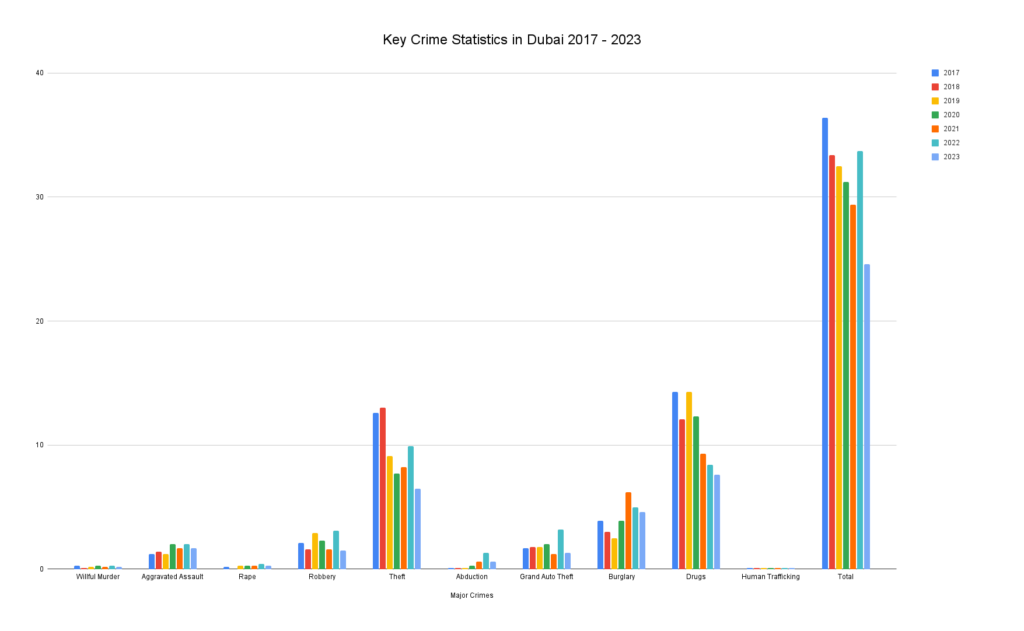
In contrast, many countries experience higher crime rates. For example, according to World Population Review, the United States has an overall crime rate of 49.2 per 100,000 people which is significantly higher compared to Dubai’s 24.6 rating in 2023.
To give you an idea, the crime rate is determined by dividing total reported crimes by the population and multiplying by 100,000.
The statistics vary by country and can be influenced by poverty, unemployment, policing, and sentencing. Most crimes, particularly violent ones, are committed by individuals aged 20 – 30.
Based on Numbeo’s 2025 crime index, here’s a comparison of Dubai with other major cities around the world:
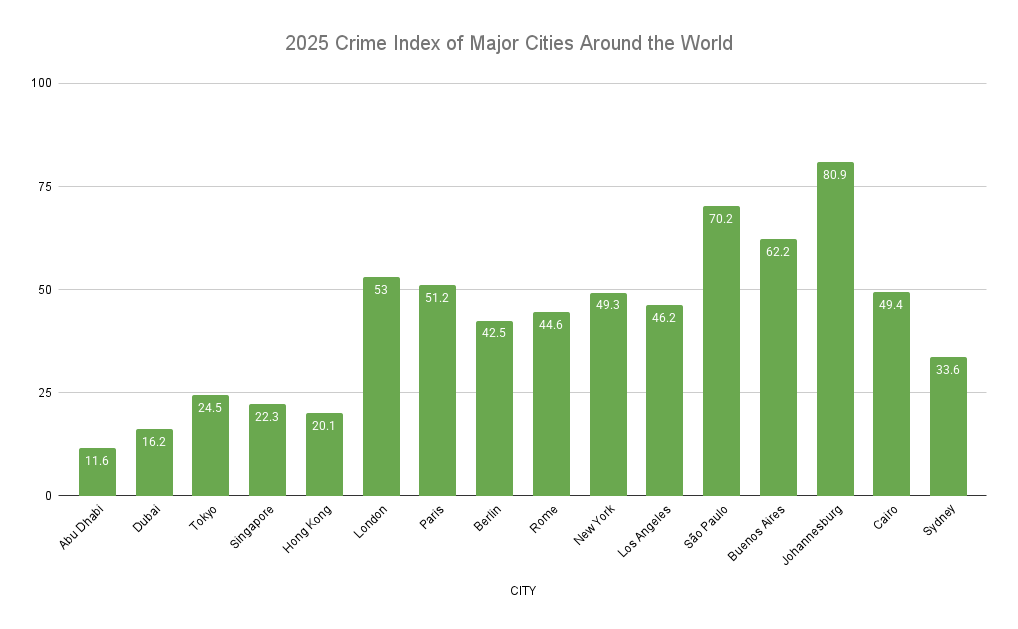
Demographics of Crime in Dubai
Crime demographics in Dubai reveal notable patterns concerning age and gender. A study by Maher Bhadri analyzing crime records from 2020 to 2022 found that males, married individuals, and those in their 30s are more prevalent among offenders.
Further data from the Dubai Statistics Center indicates that in 2022, the majority of convicted individuals were aged between 18 and 45. A significant concentration in the 25 to 30 age group has been reported.
Regarding gender, the same dataset shows that males constitute a substantial majority of those convicted, aligning with broader trends observed in the UAE.
These findings underscore the importance of targeted interventions addressing the specific demographics most involved in criminal activities in Dubai.
Here’s a chart showing the crime demographics in Dubai, including violations, felonies, and misdemeanors, from 2020 to 2022:
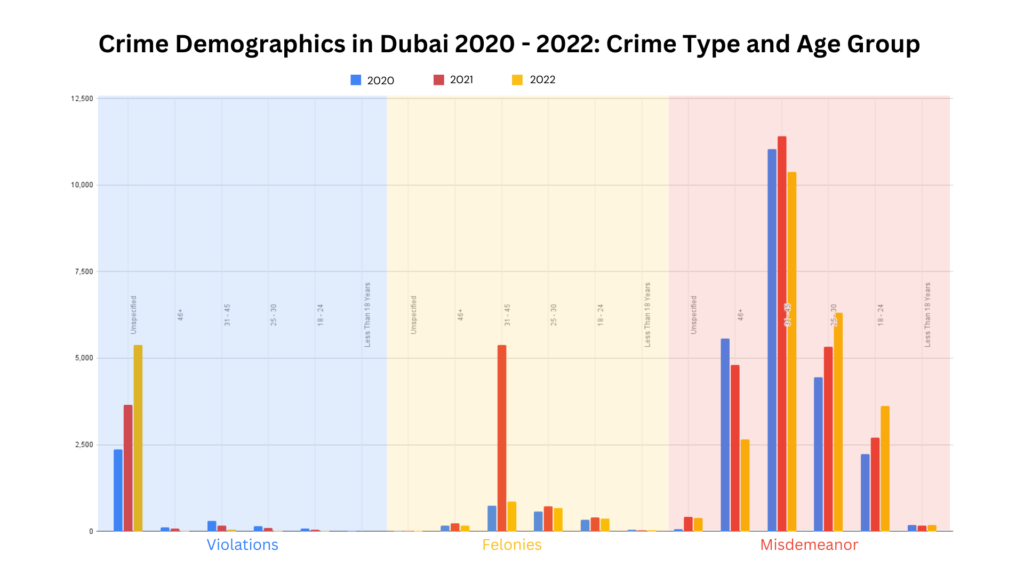
Impact of Crime on Residents and Tourism
Dubai’s low crime rate plays a crucial role in maintaining its reputation as a safe and attractive destination for both residents and tourists.
Strict law enforcement and advanced surveillance create a secure environment, boosting investor confidence and encouraging expatriates to settle in the city. For tourism, safety is a key factor, drawing millions of visitors annually.
However, the rise in cybercrime poses challenges, affecting individuals and businesses. Dubai continues to implement stringent cybersecurity measures to combat these threats.
Overall, the city’s commitment to security ensures economic stability, enhances quality of life, and strengthens its position as a global hub.
The city continues to draw international tourists with a steady increase since 2020 and the COVID-19 pandemic.
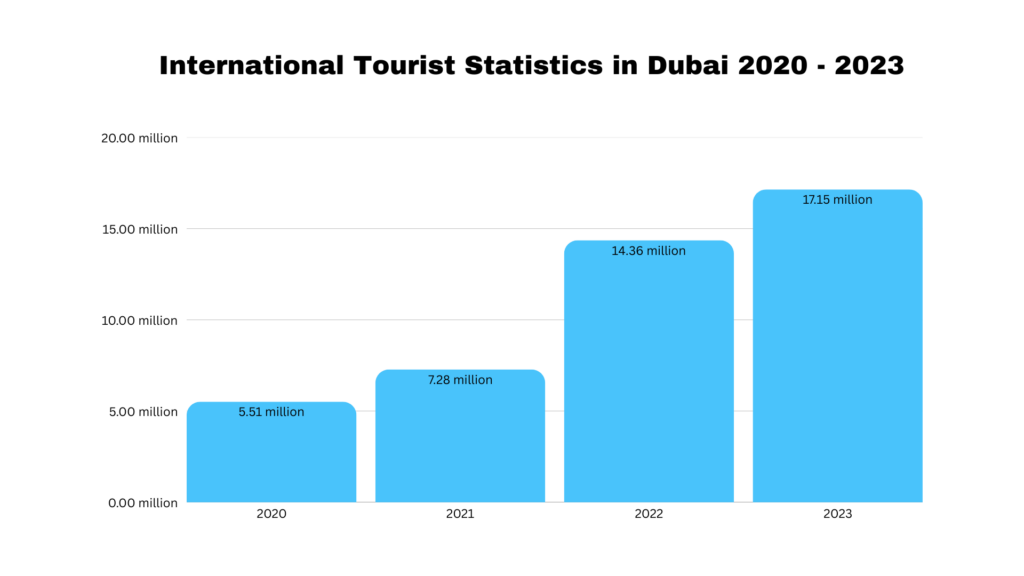
Cybercrime in Dubai
While violent crime rates in Dubai remain low, cybercrime has seen a notable increase in recent years. In 2016, the UAE experienced financial losses amounting to 5.14 billion dirhams due to cybercrime.
The COVID-19 pandemic further exacerbated the situation, with businesses in the UAE reporting significant rises in cyber threats.
Fast forward to 2024, the UAE has faced escalating cyber threats. The nation’s strategic geopolitical position makes it a prime target for nation-state actors deploying Advanced Persistent Threats (APTs), particularly against government and defense sectors.
These sophisticated attacks often utilize tactics like spear-phishing to infiltrate critical systems, according to data from the Acronis Threat Research Unit.
Comparatively, the UAE leads the Middle East in reported cyber incidents. 34 ransomware attacks were recorded between January and November 2024, up from 27 in all of 2023.
Here’s a graph showing the growing cybercrime cases in the Middle East, particularly, ransomware attacks:
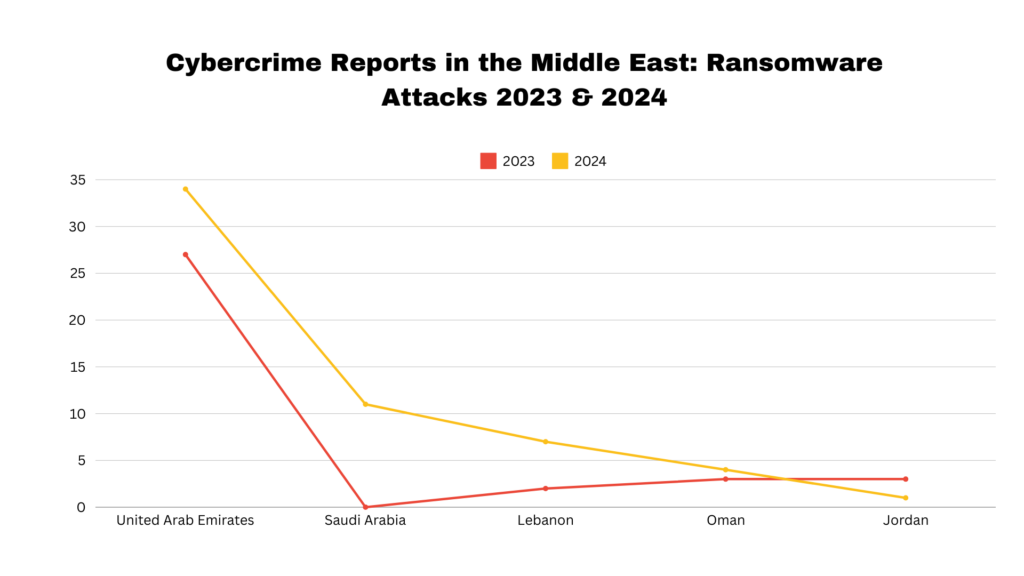
| Cybercrime Reports in the Middle East: Ransomware Attacks 2023 & 2024 | ||
| Country | 2023 | 2024 |
| United Arab Emirates | 27 | 34 |
| Saudi Arabia | n/a | 11 |
| Lebanon | 2 | 7 |
| Oman | 3 | 4 |
| Jordan | 3 | 1 |
Additionally, Acronis also reports the increase of Malware detections from 2023 to 2024, from 16.05% jumping to 26.52%, representing a 65.3% increase.
Meanwhile, phishing attacks are expected to become more sophisticated in 2025 with the rise of AI and deepfake technology. These allow cybercriminals to impersonate executives and exploit Business Email Compromise (BEC) schemes.
Acronis urges businesses to enhance cybersecurity measures to protect economic stability and counter rising cyber risks. Although the UAE is not among the top global cyberattack targets, it remains a primary regional focus.
As the country advances in AI, it must balance opportunities with risks by strengthening security strategies and fostering collaboration to combat evolving cyber threats.
Preventive Measures and Initiatives in Dubai
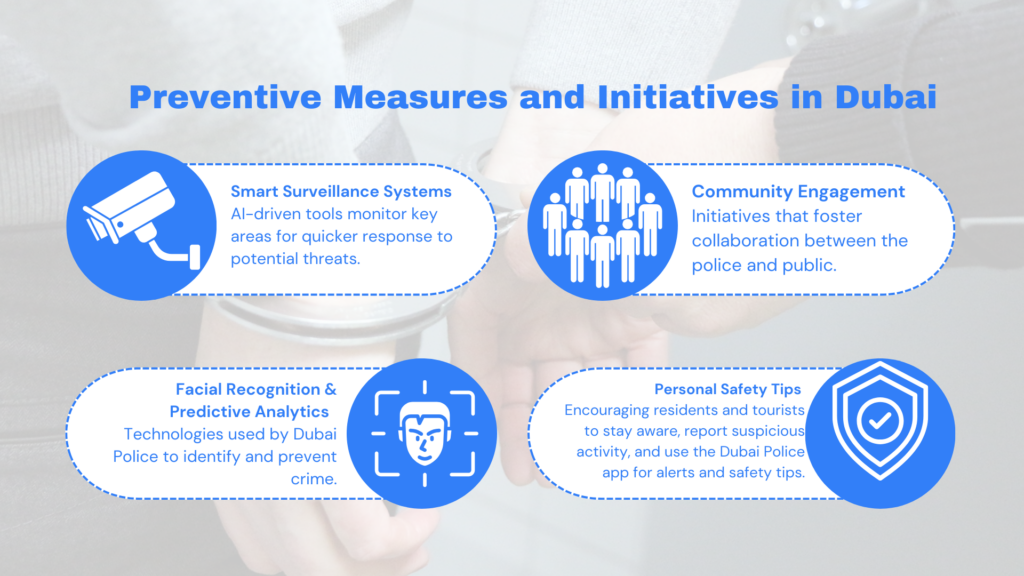
A range of innovative crime prevention measures have been implemented in the city to ensure the safety of both residents and visitors.
Dubai employs smart surveillance systems across key areas, using AI-driven policing to detect and respond to potential threats more efficiently.
Dubai Police also utilize advanced technologies like facial recognition and predictive analytics to enhance crime prevention efforts.
Community engagement programs play a pivotal role, with initiatives aimed at fostering collaboration between the police and the public to ensure a safer environment.
For residents and tourists, staying aware of surroundings, reporting suspicious activity, and adhering to local laws can significantly enhance personal safety.
Additionally, utilizing the Dubai Police app for emergency alerts and tips is a practical way to stay informed.
Government Policies and Law Enforcement in Dubai
Dubai’s crime laws are founded on a strict legal framework that ensures safety and security for all.
The UAE enforces a zero-tolerance policy on drug-related offenses, with severe penalties for possession, trafficking, or use. Similarly, cybercrime laws are stringent, with harsh penalties for hacking, online fraud, and other digital offenses.
Dubai Police continue to strengthen law enforcement efforts through ongoing training, advanced technology, and strategic partnerships with international law enforcement agencies.
The city’s legal system is designed to deter crime while ensuring swift justice for offenders.
For residents and visitors, understanding these policies is crucial to avoiding legal trouble.
To stay informed and up-to-date on crime laws and regulations, residents and tourists can visit official Dubai Police resources for more detailed information.
Resources for Victims and Crime Prevention
Dubai offers a variety of resources for crime victims and those seeking crime prevention advice. Victims of crime can reach out to the Dubai Police through their 24/7 emergency hotline at 999 or visit the nearest police station for support.
The Dubai Police app provides easy access to report incidents and receive safety tips. Additionally, residents and visitors can benefit from community outreach programs aimed at educating the public on crime prevention strategies.
Here are some emergency hotline numbers to take note of:
| Police Hotline | 999 |
| Ambulance | 998 |
| Fire Department (Civil Defence) | 997 |
| Coastguard | 996 |
| Find and Rescue | 995 |
| Electricity failure | 991 |
Additionally, you may also use Aman Service Dubai, a community initiative by Dubai Police, offering 24/7 support for residents and visitors. It provides a range of services, including emergency response, safety tips, and assistance with non-criminal issues.

